HI5015 Legal Aspects: Regulatory Frameworks for Siemens in Australia
VerifiedAdded on 2022/09/06
|12
|2681
|15
Report
AI Summary
This report provides an in-depth analysis of Siemens' international business operations within the Australian market. It examines the various regulatory frameworks that impact Siemens, including taxation, environmental conservation and workplace safety laws, product liability regulations, and consumer laws. The report also explores the influence of treaties and international trade agreements, such as bilateral and multilateral agreements, on Siemens' products and services in Australia. It highlights the company's compliance with Australian tax policies, its commitment to environmental sustainability and workplace safety, and its adherence to consumer protection laws. Furthermore, the report discusses the impact of free trade agreements and the World Trade Organization on Siemens' market access and overall business performance in Australia, concluding with a comprehensive overview of the challenges and opportunities faced by the company in navigating the complex legal landscape of international business.
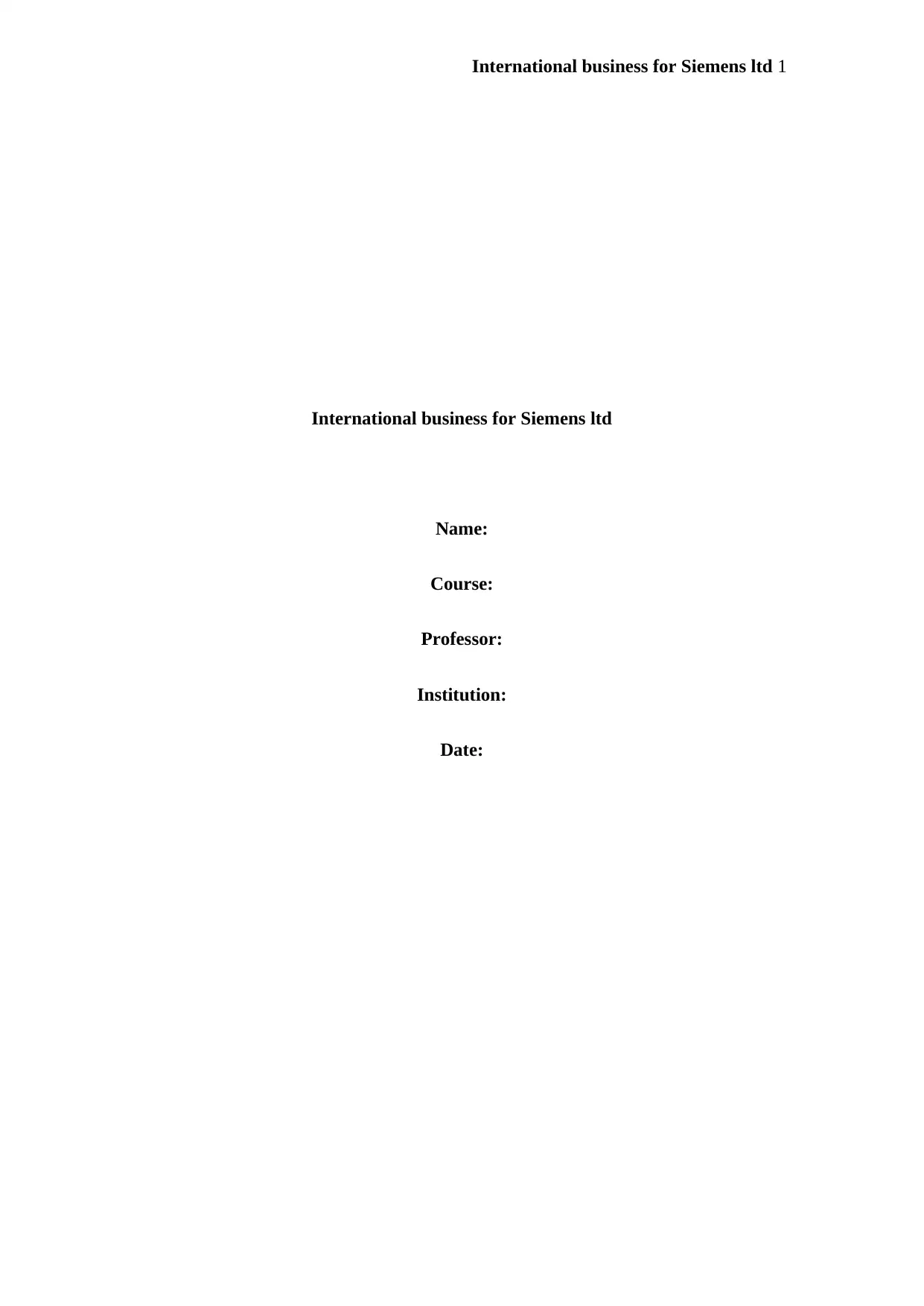
International business for Siemens ltd 1
International business for Siemens ltd
Name:
Course:
Professor:
Institution:
Date:
International business for Siemens ltd
Name:
Course:
Professor:
Institution:
Date:
Paraphrase This Document
Need a fresh take? Get an instant paraphrase of this document with our AI Paraphraser
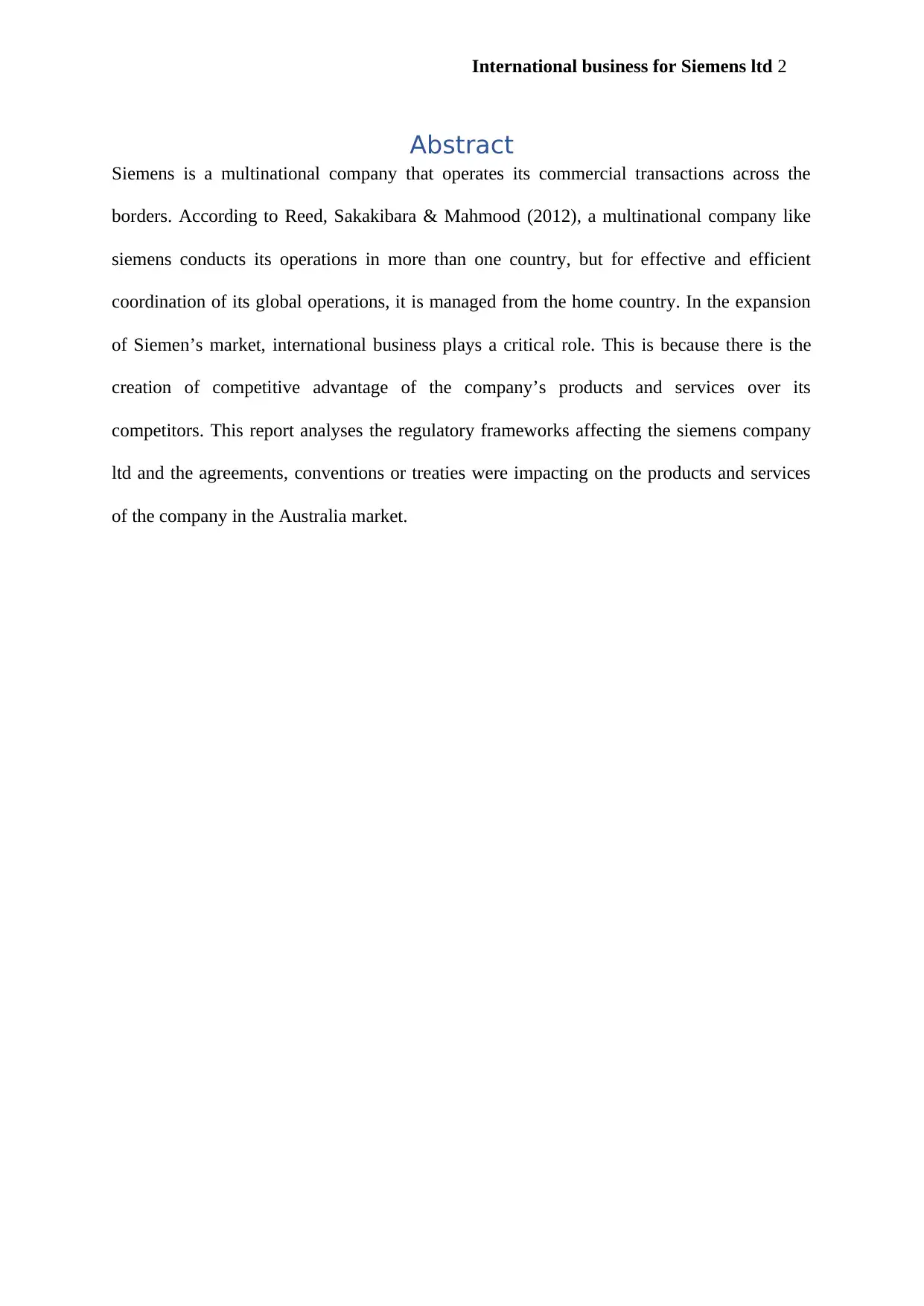
International business for Siemens ltd 2
Abstract
Siemens is a multinational company that operates its commercial transactions across the
borders. According to Reed, Sakakibara & Mahmood (2012), a multinational company like
siemens conducts its operations in more than one country, but for effective and efficient
coordination of its global operations, it is managed from the home country. In the expansion
of Siemen’s market, international business plays a critical role. This is because there is the
creation of competitive advantage of the company’s products and services over its
competitors. This report analyses the regulatory frameworks affecting the siemens company
ltd and the agreements, conventions or treaties were impacting on the products and services
of the company in the Australia market.
Abstract
Siemens is a multinational company that operates its commercial transactions across the
borders. According to Reed, Sakakibara & Mahmood (2012), a multinational company like
siemens conducts its operations in more than one country, but for effective and efficient
coordination of its global operations, it is managed from the home country. In the expansion
of Siemen’s market, international business plays a critical role. This is because there is the
creation of competitive advantage of the company’s products and services over its
competitors. This report analyses the regulatory frameworks affecting the siemens company
ltd and the agreements, conventions or treaties were impacting on the products and services
of the company in the Australia market.
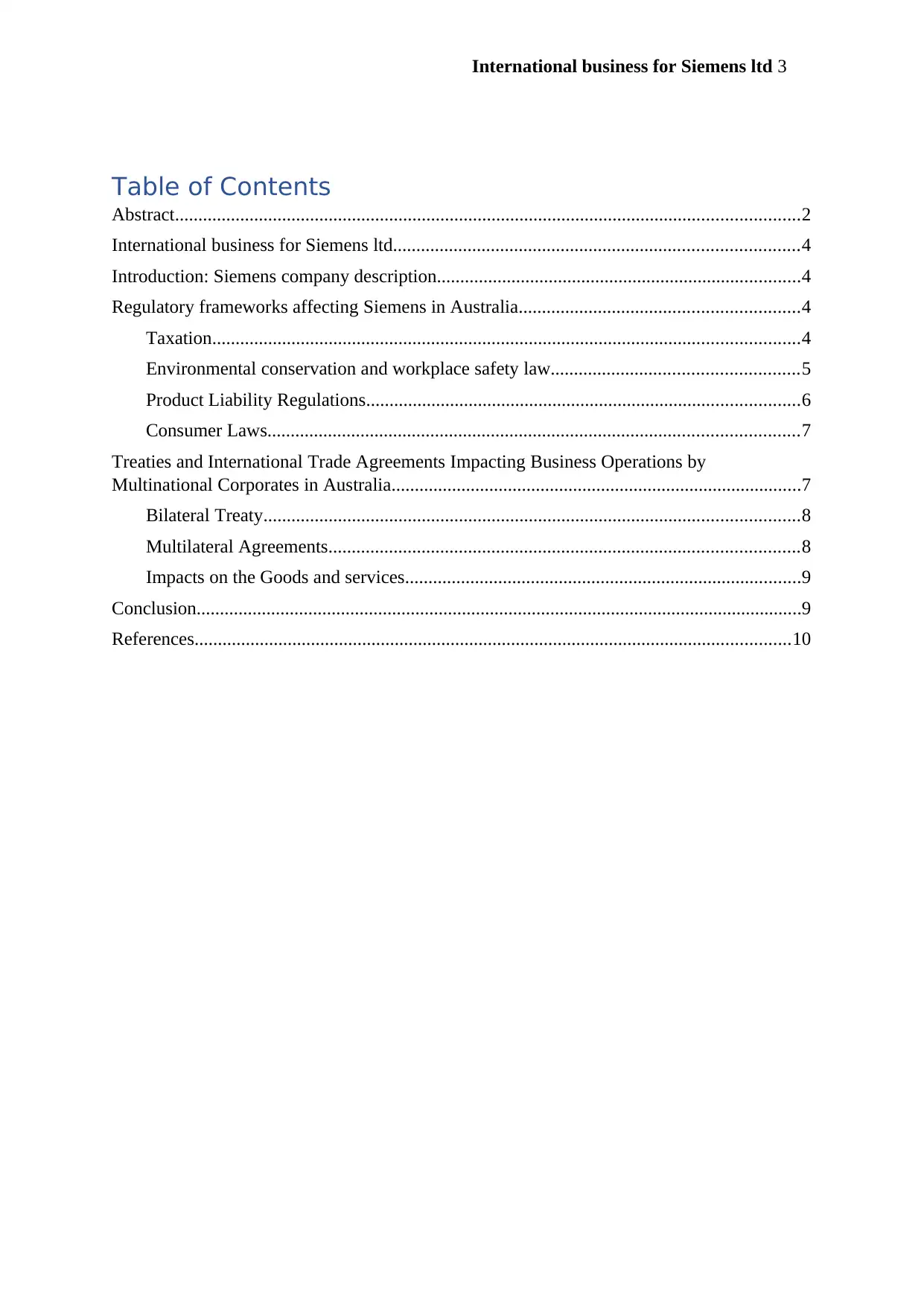
International business for Siemens ltd 3
Table of Contents
Abstract......................................................................................................................................2
International business for Siemens ltd.......................................................................................4
Introduction: Siemens company description..............................................................................4
Regulatory frameworks affecting Siemens in Australia............................................................4
Taxation..............................................................................................................................4
Environmental conservation and workplace safety law.....................................................5
Product Liability Regulations.............................................................................................6
Consumer Laws..................................................................................................................7
Treaties and International Trade Agreements Impacting Business Operations by
Multinational Corporates in Australia........................................................................................7
Bilateral Treaty...................................................................................................................8
Multilateral Agreements.....................................................................................................8
Impacts on the Goods and services.....................................................................................9
Conclusion..................................................................................................................................9
References................................................................................................................................10
Table of Contents
Abstract......................................................................................................................................2
International business for Siemens ltd.......................................................................................4
Introduction: Siemens company description..............................................................................4
Regulatory frameworks affecting Siemens in Australia............................................................4
Taxation..............................................................................................................................4
Environmental conservation and workplace safety law.....................................................5
Product Liability Regulations.............................................................................................6
Consumer Laws..................................................................................................................7
Treaties and International Trade Agreements Impacting Business Operations by
Multinational Corporates in Australia........................................................................................7
Bilateral Treaty...................................................................................................................8
Multilateral Agreements.....................................................................................................8
Impacts on the Goods and services.....................................................................................9
Conclusion..................................................................................................................................9
References................................................................................................................................10
⊘ This is a preview!⊘
Do you want full access?
Subscribe today to unlock all pages.

Trusted by 1+ million students worldwide
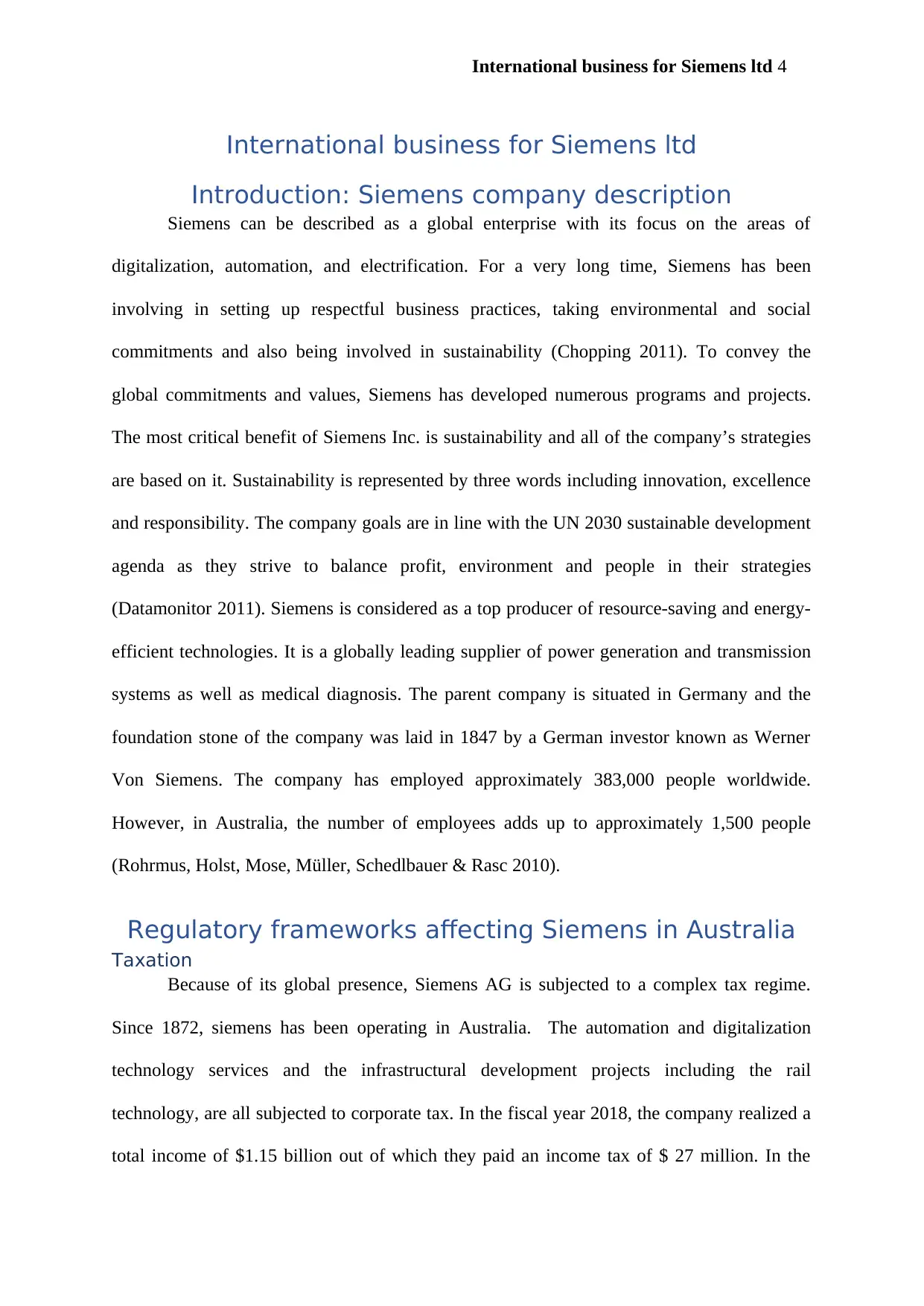
International business for Siemens ltd 4
International business for Siemens ltd
Introduction: Siemens company description
Siemens can be described as a global enterprise with its focus on the areas of
digitalization, automation, and electrification. For a very long time, Siemens has been
involving in setting up respectful business practices, taking environmental and social
commitments and also being involved in sustainability (Chopping 2011). To convey the
global commitments and values, Siemens has developed numerous programs and projects.
The most critical benefit of Siemens Inc. is sustainability and all of the company’s strategies
are based on it. Sustainability is represented by three words including innovation, excellence
and responsibility. The company goals are in line with the UN 2030 sustainable development
agenda as they strive to balance profit, environment and people in their strategies
(Datamonitor 2011). Siemens is considered as a top producer of resource-saving and energy-
efficient technologies. It is a globally leading supplier of power generation and transmission
systems as well as medical diagnosis. The parent company is situated in Germany and the
foundation stone of the company was laid in 1847 by a German investor known as Werner
Von Siemens. The company has employed approximately 383,000 people worldwide.
However, in Australia, the number of employees adds up to approximately 1,500 people
(Rohrmus, Holst, Mose, Müller, Schedlbauer & Rasc 2010).
Regulatory frameworks affecting Siemens in Australia
Taxation
Because of its global presence, Siemens AG is subjected to a complex tax regime.
Since 1872, siemens has been operating in Australia. The automation and digitalization
technology services and the infrastructural development projects including the rail
technology, are all subjected to corporate tax. In the fiscal year 2018, the company realized a
total income of $1.15 billion out of which they paid an income tax of $ 27 million. In the
International business for Siemens ltd
Introduction: Siemens company description
Siemens can be described as a global enterprise with its focus on the areas of
digitalization, automation, and electrification. For a very long time, Siemens has been
involving in setting up respectful business practices, taking environmental and social
commitments and also being involved in sustainability (Chopping 2011). To convey the
global commitments and values, Siemens has developed numerous programs and projects.
The most critical benefit of Siemens Inc. is sustainability and all of the company’s strategies
are based on it. Sustainability is represented by three words including innovation, excellence
and responsibility. The company goals are in line with the UN 2030 sustainable development
agenda as they strive to balance profit, environment and people in their strategies
(Datamonitor 2011). Siemens is considered as a top producer of resource-saving and energy-
efficient technologies. It is a globally leading supplier of power generation and transmission
systems as well as medical diagnosis. The parent company is situated in Germany and the
foundation stone of the company was laid in 1847 by a German investor known as Werner
Von Siemens. The company has employed approximately 383,000 people worldwide.
However, in Australia, the number of employees adds up to approximately 1,500 people
(Rohrmus, Holst, Mose, Müller, Schedlbauer & Rasc 2010).
Regulatory frameworks affecting Siemens in Australia
Taxation
Because of its global presence, Siemens AG is subjected to a complex tax regime.
Since 1872, siemens has been operating in Australia. The automation and digitalization
technology services and the infrastructural development projects including the rail
technology, are all subjected to corporate tax. In the fiscal year 2018, the company realized a
total income of $1.15 billion out of which they paid an income tax of $ 27 million. In the
Paraphrase This Document
Need a fresh take? Get an instant paraphrase of this document with our AI Paraphraser
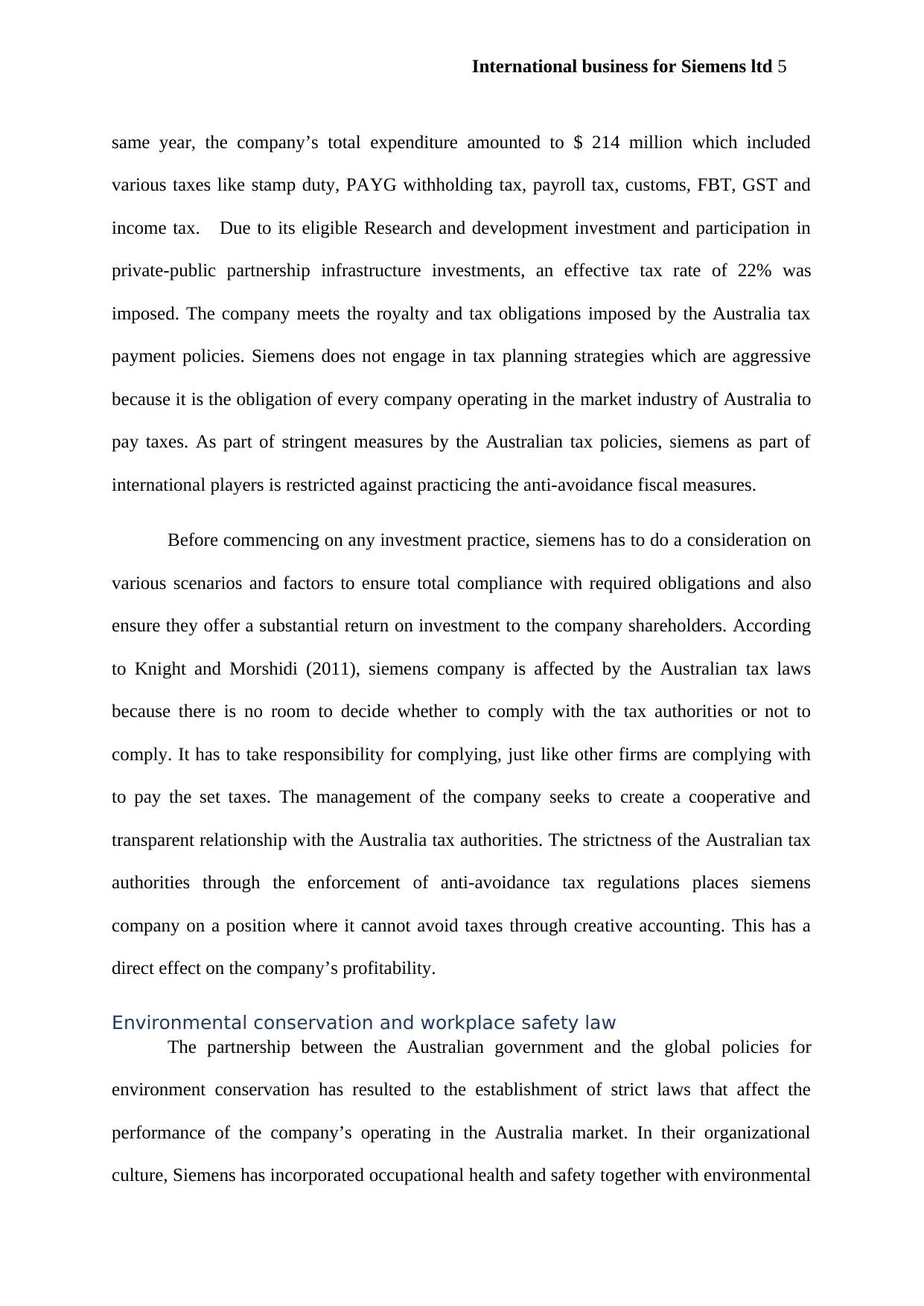
International business for Siemens ltd 5
same year, the company’s total expenditure amounted to $ 214 million which included
various taxes like stamp duty, PAYG withholding tax, payroll tax, customs, FBT, GST and
income tax. Due to its eligible Research and development investment and participation in
private-public partnership infrastructure investments, an effective tax rate of 22% was
imposed. The company meets the royalty and tax obligations imposed by the Australia tax
payment policies. Siemens does not engage in tax planning strategies which are aggressive
because it is the obligation of every company operating in the market industry of Australia to
pay taxes. As part of stringent measures by the Australian tax policies, siemens as part of
international players is restricted against practicing the anti-avoidance fiscal measures.
Before commencing on any investment practice, siemens has to do a consideration on
various scenarios and factors to ensure total compliance with required obligations and also
ensure they offer a substantial return on investment to the company shareholders. According
to Knight and Morshidi (2011), siemens company is affected by the Australian tax laws
because there is no room to decide whether to comply with the tax authorities or not to
comply. It has to take responsibility for complying, just like other firms are complying with
to pay the set taxes. The management of the company seeks to create a cooperative and
transparent relationship with the Australia tax authorities. The strictness of the Australian tax
authorities through the enforcement of anti-avoidance tax regulations places siemens
company on a position where it cannot avoid taxes through creative accounting. This has a
direct effect on the company’s profitability.
Environmental conservation and workplace safety law
The partnership between the Australian government and the global policies for
environment conservation has resulted to the establishment of strict laws that affect the
performance of the company’s operating in the Australia market. In their organizational
culture, Siemens has incorporated occupational health and safety together with environmental
same year, the company’s total expenditure amounted to $ 214 million which included
various taxes like stamp duty, PAYG withholding tax, payroll tax, customs, FBT, GST and
income tax. Due to its eligible Research and development investment and participation in
private-public partnership infrastructure investments, an effective tax rate of 22% was
imposed. The company meets the royalty and tax obligations imposed by the Australia tax
payment policies. Siemens does not engage in tax planning strategies which are aggressive
because it is the obligation of every company operating in the market industry of Australia to
pay taxes. As part of stringent measures by the Australian tax policies, siemens as part of
international players is restricted against practicing the anti-avoidance fiscal measures.
Before commencing on any investment practice, siemens has to do a consideration on
various scenarios and factors to ensure total compliance with required obligations and also
ensure they offer a substantial return on investment to the company shareholders. According
to Knight and Morshidi (2011), siemens company is affected by the Australian tax laws
because there is no room to decide whether to comply with the tax authorities or not to
comply. It has to take responsibility for complying, just like other firms are complying with
to pay the set taxes. The management of the company seeks to create a cooperative and
transparent relationship with the Australia tax authorities. The strictness of the Australian tax
authorities through the enforcement of anti-avoidance tax regulations places siemens
company on a position where it cannot avoid taxes through creative accounting. This has a
direct effect on the company’s profitability.
Environmental conservation and workplace safety law
The partnership between the Australian government and the global policies for
environment conservation has resulted to the establishment of strict laws that affect the
performance of the company’s operating in the Australia market. In their organizational
culture, Siemens has incorporated occupational health and safety together with environmental
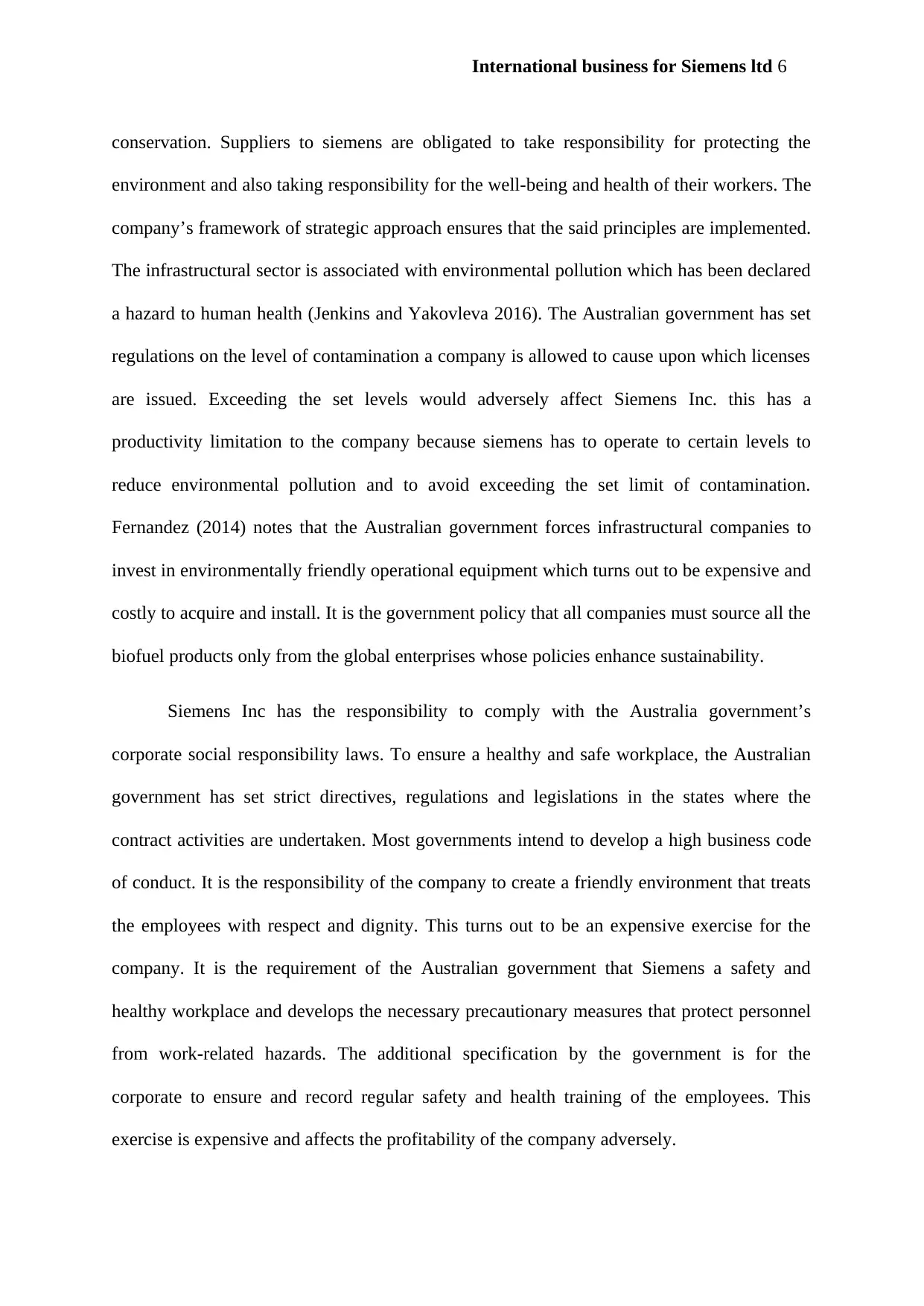
International business for Siemens ltd 6
conservation. Suppliers to siemens are obligated to take responsibility for protecting the
environment and also taking responsibility for the well-being and health of their workers. The
company’s framework of strategic approach ensures that the said principles are implemented.
The infrastructural sector is associated with environmental pollution which has been declared
a hazard to human health (Jenkins and Yakovleva 2016). The Australian government has set
regulations on the level of contamination a company is allowed to cause upon which licenses
are issued. Exceeding the set levels would adversely affect Siemens Inc. this has a
productivity limitation to the company because siemens has to operate to certain levels to
reduce environmental pollution and to avoid exceeding the set limit of contamination.
Fernandez (2014) notes that the Australian government forces infrastructural companies to
invest in environmentally friendly operational equipment which turns out to be expensive and
costly to acquire and install. It is the government policy that all companies must source all the
biofuel products only from the global enterprises whose policies enhance sustainability.
Siemens Inc has the responsibility to comply with the Australia government’s
corporate social responsibility laws. To ensure a healthy and safe workplace, the Australian
government has set strict directives, regulations and legislations in the states where the
contract activities are undertaken. Most governments intend to develop a high business code
of conduct. It is the responsibility of the company to create a friendly environment that treats
the employees with respect and dignity. This turns out to be an expensive exercise for the
company. It is the requirement of the Australian government that Siemens a safety and
healthy workplace and develops the necessary precautionary measures that protect personnel
from work-related hazards. The additional specification by the government is for the
corporate to ensure and record regular safety and health training of the employees. This
exercise is expensive and affects the profitability of the company adversely.
conservation. Suppliers to siemens are obligated to take responsibility for protecting the
environment and also taking responsibility for the well-being and health of their workers. The
company’s framework of strategic approach ensures that the said principles are implemented.
The infrastructural sector is associated with environmental pollution which has been declared
a hazard to human health (Jenkins and Yakovleva 2016). The Australian government has set
regulations on the level of contamination a company is allowed to cause upon which licenses
are issued. Exceeding the set levels would adversely affect Siemens Inc. this has a
productivity limitation to the company because siemens has to operate to certain levels to
reduce environmental pollution and to avoid exceeding the set limit of contamination.
Fernandez (2014) notes that the Australian government forces infrastructural companies to
invest in environmentally friendly operational equipment which turns out to be expensive and
costly to acquire and install. It is the government policy that all companies must source all the
biofuel products only from the global enterprises whose policies enhance sustainability.
Siemens Inc has the responsibility to comply with the Australia government’s
corporate social responsibility laws. To ensure a healthy and safe workplace, the Australian
government has set strict directives, regulations and legislations in the states where the
contract activities are undertaken. Most governments intend to develop a high business code
of conduct. It is the responsibility of the company to create a friendly environment that treats
the employees with respect and dignity. This turns out to be an expensive exercise for the
company. It is the requirement of the Australian government that Siemens a safety and
healthy workplace and develops the necessary precautionary measures that protect personnel
from work-related hazards. The additional specification by the government is for the
corporate to ensure and record regular safety and health training of the employees. This
exercise is expensive and affects the profitability of the company adversely.
⊘ This is a preview!⊘
Do you want full access?
Subscribe today to unlock all pages.

Trusted by 1+ million students worldwide
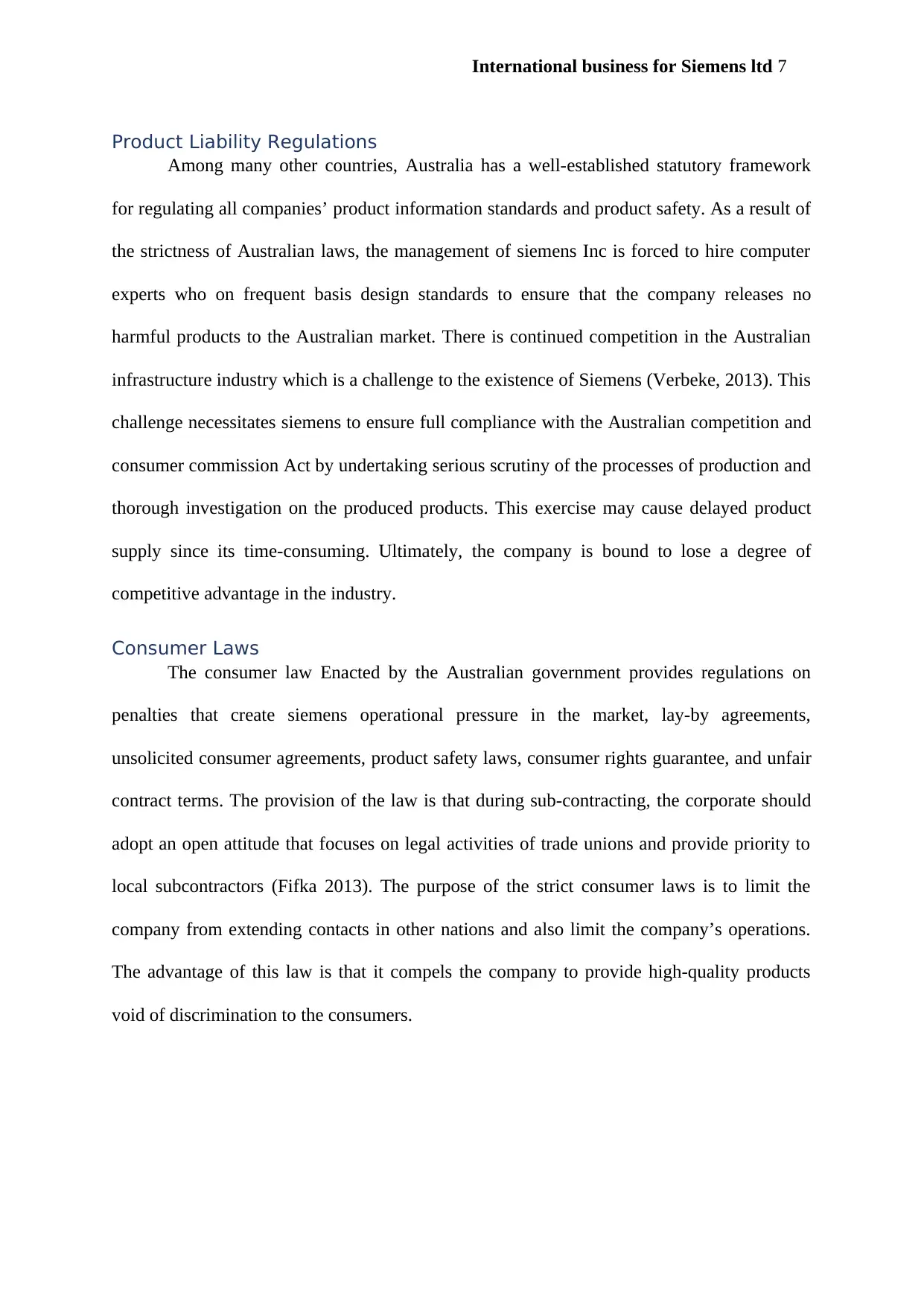
International business for Siemens ltd 7
Product Liability Regulations
Among many other countries, Australia has a well-established statutory framework
for regulating all companies’ product information standards and product safety. As a result of
the strictness of Australian laws, the management of siemens Inc is forced to hire computer
experts who on frequent basis design standards to ensure that the company releases no
harmful products to the Australian market. There is continued competition in the Australian
infrastructure industry which is a challenge to the existence of Siemens (Verbeke, 2013). This
challenge necessitates siemens to ensure full compliance with the Australian competition and
consumer commission Act by undertaking serious scrutiny of the processes of production and
thorough investigation on the produced products. This exercise may cause delayed product
supply since its time-consuming. Ultimately, the company is bound to lose a degree of
competitive advantage in the industry.
Consumer Laws
The consumer law Enacted by the Australian government provides regulations on
penalties that create siemens operational pressure in the market, lay-by agreements,
unsolicited consumer agreements, product safety laws, consumer rights guarantee, and unfair
contract terms. The provision of the law is that during sub-contracting, the corporate should
adopt an open attitude that focuses on legal activities of trade unions and provide priority to
local subcontractors (Fifka 2013). The purpose of the strict consumer laws is to limit the
company from extending contacts in other nations and also limit the company’s operations.
The advantage of this law is that it compels the company to provide high-quality products
void of discrimination to the consumers.
Product Liability Regulations
Among many other countries, Australia has a well-established statutory framework
for regulating all companies’ product information standards and product safety. As a result of
the strictness of Australian laws, the management of siemens Inc is forced to hire computer
experts who on frequent basis design standards to ensure that the company releases no
harmful products to the Australian market. There is continued competition in the Australian
infrastructure industry which is a challenge to the existence of Siemens (Verbeke, 2013). This
challenge necessitates siemens to ensure full compliance with the Australian competition and
consumer commission Act by undertaking serious scrutiny of the processes of production and
thorough investigation on the produced products. This exercise may cause delayed product
supply since its time-consuming. Ultimately, the company is bound to lose a degree of
competitive advantage in the industry.
Consumer Laws
The consumer law Enacted by the Australian government provides regulations on
penalties that create siemens operational pressure in the market, lay-by agreements,
unsolicited consumer agreements, product safety laws, consumer rights guarantee, and unfair
contract terms. The provision of the law is that during sub-contracting, the corporate should
adopt an open attitude that focuses on legal activities of trade unions and provide priority to
local subcontractors (Fifka 2013). The purpose of the strict consumer laws is to limit the
company from extending contacts in other nations and also limit the company’s operations.
The advantage of this law is that it compels the company to provide high-quality products
void of discrimination to the consumers.
Paraphrase This Document
Need a fresh take? Get an instant paraphrase of this document with our AI Paraphraser
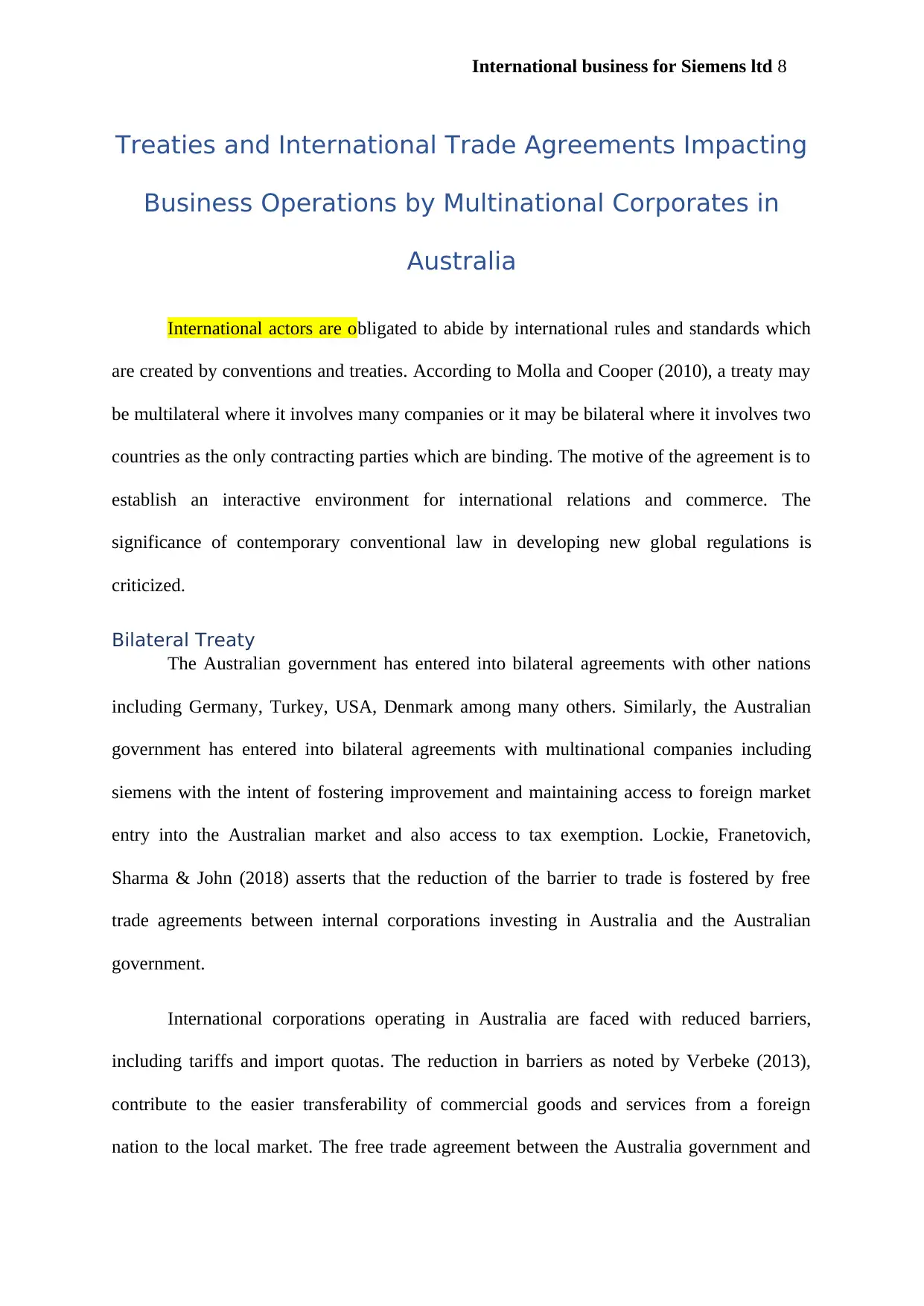
International business for Siemens ltd 8
Treaties and International Trade Agreements Impacting
Business Operations by Multinational Corporates in
Australia
International actors are obligated to abide by international rules and standards which
are created by conventions and treaties. According to Molla and Cooper (2010), a treaty may
be multilateral where it involves many companies or it may be bilateral where it involves two
countries as the only contracting parties which are binding. The motive of the agreement is to
establish an interactive environment for international relations and commerce. The
significance of contemporary conventional law in developing new global regulations is
criticized.
Bilateral Treaty
The Australian government has entered into bilateral agreements with other nations
including Germany, Turkey, USA, Denmark among many others. Similarly, the Australian
government has entered into bilateral agreements with multinational companies including
siemens with the intent of fostering improvement and maintaining access to foreign market
entry into the Australian market and also access to tax exemption. Lockie, Franetovich,
Sharma & John (2018) asserts that the reduction of the barrier to trade is fostered by free
trade agreements between internal corporations investing in Australia and the Australian
government.
International corporations operating in Australia are faced with reduced barriers,
including tariffs and import quotas. The reduction in barriers as noted by Verbeke (2013),
contribute to the easier transferability of commercial goods and services from a foreign
nation to the local market. The free trade agreement between the Australia government and
Treaties and International Trade Agreements Impacting
Business Operations by Multinational Corporates in
Australia
International actors are obligated to abide by international rules and standards which
are created by conventions and treaties. According to Molla and Cooper (2010), a treaty may
be multilateral where it involves many companies or it may be bilateral where it involves two
countries as the only contracting parties which are binding. The motive of the agreement is to
establish an interactive environment for international relations and commerce. The
significance of contemporary conventional law in developing new global regulations is
criticized.
Bilateral Treaty
The Australian government has entered into bilateral agreements with other nations
including Germany, Turkey, USA, Denmark among many others. Similarly, the Australian
government has entered into bilateral agreements with multinational companies including
siemens with the intent of fostering improvement and maintaining access to foreign market
entry into the Australian market and also access to tax exemption. Lockie, Franetovich,
Sharma & John (2018) asserts that the reduction of the barrier to trade is fostered by free
trade agreements between internal corporations investing in Australia and the Australian
government.
International corporations operating in Australia are faced with reduced barriers,
including tariffs and import quotas. The reduction in barriers as noted by Verbeke (2013),
contribute to the easier transferability of commercial goods and services from a foreign
nation to the local market. The free trade agreement between the Australia government and
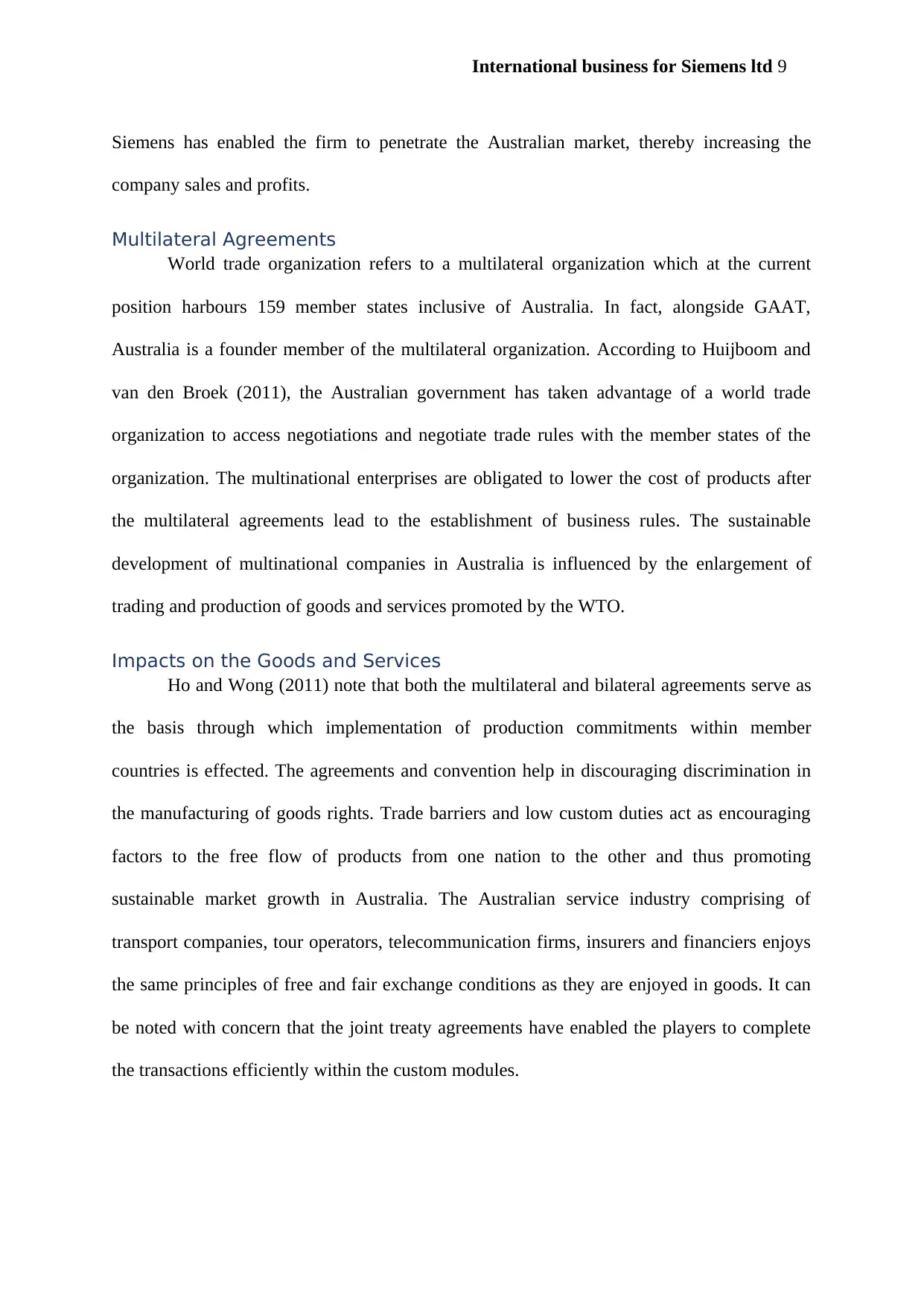
International business for Siemens ltd 9
Siemens has enabled the firm to penetrate the Australian market, thereby increasing the
company sales and profits.
Multilateral Agreements
World trade organization refers to a multilateral organization which at the current
position harbours 159 member states inclusive of Australia. In fact, alongside GAAT,
Australia is a founder member of the multilateral organization. According to Huijboom and
van den Broek (2011), the Australian government has taken advantage of a world trade
organization to access negotiations and negotiate trade rules with the member states of the
organization. The multinational enterprises are obligated to lower the cost of products after
the multilateral agreements lead to the establishment of business rules. The sustainable
development of multinational companies in Australia is influenced by the enlargement of
trading and production of goods and services promoted by the WTO.
Impacts on the Goods and Services
Ho and Wong (2011) note that both the multilateral and bilateral agreements serve as
the basis through which implementation of production commitments within member
countries is effected. The agreements and convention help in discouraging discrimination in
the manufacturing of goods rights. Trade barriers and low custom duties act as encouraging
factors to the free flow of products from one nation to the other and thus promoting
sustainable market growth in Australia. The Australian service industry comprising of
transport companies, tour operators, telecommunication firms, insurers and financiers enjoys
the same principles of free and fair exchange conditions as they are enjoyed in goods. It can
be noted with concern that the joint treaty agreements have enabled the players to complete
the transactions efficiently within the custom modules.
Siemens has enabled the firm to penetrate the Australian market, thereby increasing the
company sales and profits.
Multilateral Agreements
World trade organization refers to a multilateral organization which at the current
position harbours 159 member states inclusive of Australia. In fact, alongside GAAT,
Australia is a founder member of the multilateral organization. According to Huijboom and
van den Broek (2011), the Australian government has taken advantage of a world trade
organization to access negotiations and negotiate trade rules with the member states of the
organization. The multinational enterprises are obligated to lower the cost of products after
the multilateral agreements lead to the establishment of business rules. The sustainable
development of multinational companies in Australia is influenced by the enlargement of
trading and production of goods and services promoted by the WTO.
Impacts on the Goods and Services
Ho and Wong (2011) note that both the multilateral and bilateral agreements serve as
the basis through which implementation of production commitments within member
countries is effected. The agreements and convention help in discouraging discrimination in
the manufacturing of goods rights. Trade barriers and low custom duties act as encouraging
factors to the free flow of products from one nation to the other and thus promoting
sustainable market growth in Australia. The Australian service industry comprising of
transport companies, tour operators, telecommunication firms, insurers and financiers enjoys
the same principles of free and fair exchange conditions as they are enjoyed in goods. It can
be noted with concern that the joint treaty agreements have enabled the players to complete
the transactions efficiently within the custom modules.
⊘ This is a preview!⊘
Do you want full access?
Subscribe today to unlock all pages.

Trusted by 1+ million students worldwide
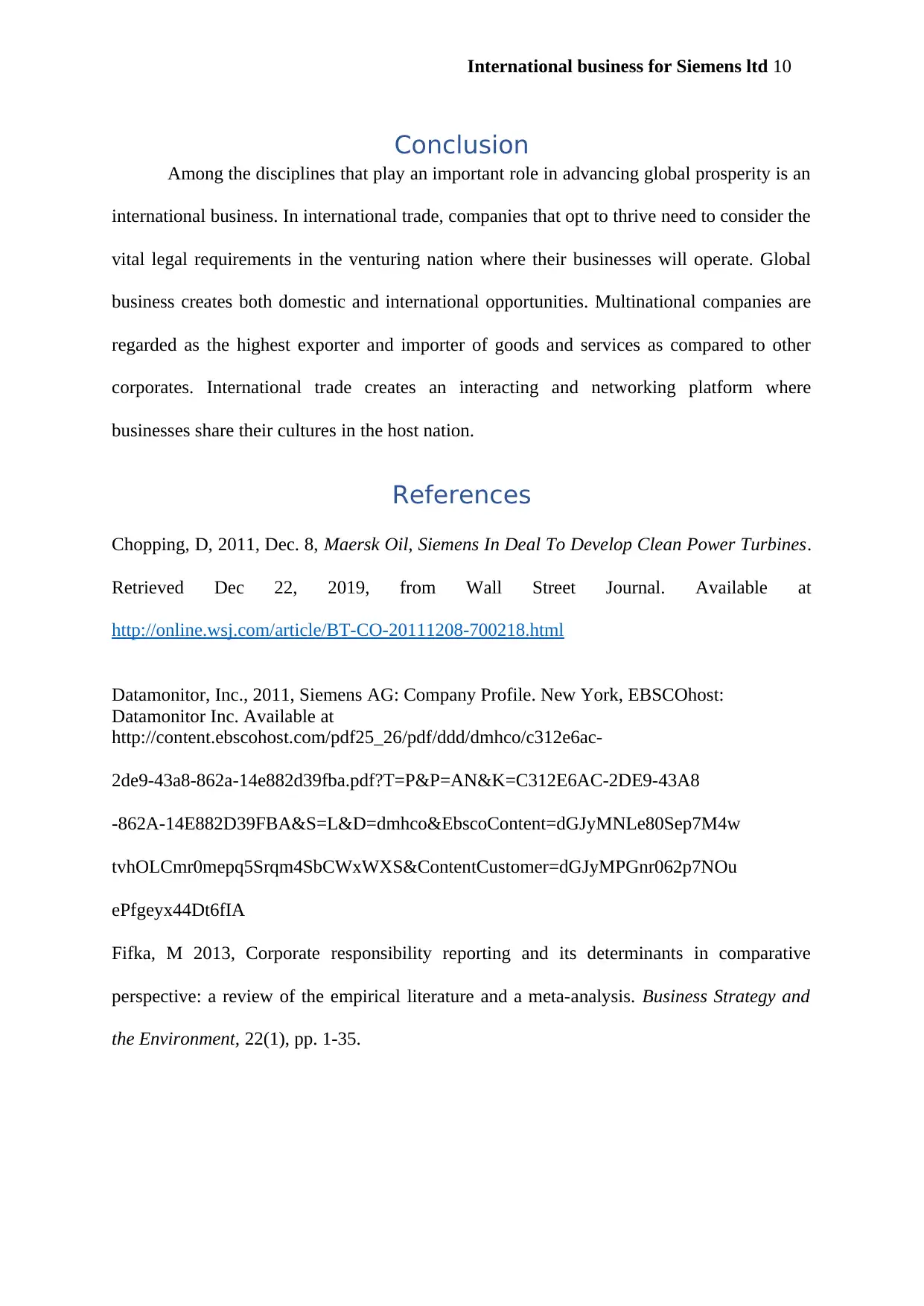
International business for Siemens ltd 10
Conclusion
Among the disciplines that play an important role in advancing global prosperity is an
international business. In international trade, companies that opt to thrive need to consider the
vital legal requirements in the venturing nation where their businesses will operate. Global
business creates both domestic and international opportunities. Multinational companies are
regarded as the highest exporter and importer of goods and services as compared to other
corporates. International trade creates an interacting and networking platform where
businesses share their cultures in the host nation.
References
Chopping, D, 2011, Dec. 8, Maersk Oil, Siemens In Deal To Develop Clean Power Turbines.
Retrieved Dec 22, 2019, from Wall Street Journal. Available at
http://online.wsj.com/article/BT-CO-20111208-700218.html
Datamonitor, Inc., 2011, Siemens AG: Company Profile. New York, EBSCOhost:
Datamonitor Inc. Available at
http://content.ebscohost.com/pdf25_26/pdf/ddd/dmhco/c312e6ac-
2de9-43a8-862a-14e882d39fba.pdf?T=P&P=AN&K=C312E6AC-2DE9-43A8
-862A-14E882D39FBA&S=L&D=dmhco&EbscoContent=dGJyMNLe80Sep7M4w
tvhOLCmr0mepq5Srqm4SbCWxWXS&ContentCustomer=dGJyMPGnr062p7NOu
ePfgeyx44Dt6fIA
Fifka, M 2013, Corporate responsibility reporting and its determinants in comparative
perspective: a review of the empirical literature and a meta-analysis. Business Strategy and
the Environment, 22(1), pp. 1-35.
Conclusion
Among the disciplines that play an important role in advancing global prosperity is an
international business. In international trade, companies that opt to thrive need to consider the
vital legal requirements in the venturing nation where their businesses will operate. Global
business creates both domestic and international opportunities. Multinational companies are
regarded as the highest exporter and importer of goods and services as compared to other
corporates. International trade creates an interacting and networking platform where
businesses share their cultures in the host nation.
References
Chopping, D, 2011, Dec. 8, Maersk Oil, Siemens In Deal To Develop Clean Power Turbines.
Retrieved Dec 22, 2019, from Wall Street Journal. Available at
http://online.wsj.com/article/BT-CO-20111208-700218.html
Datamonitor, Inc., 2011, Siemens AG: Company Profile. New York, EBSCOhost:
Datamonitor Inc. Available at
http://content.ebscohost.com/pdf25_26/pdf/ddd/dmhco/c312e6ac-
2de9-43a8-862a-14e882d39fba.pdf?T=P&P=AN&K=C312E6AC-2DE9-43A8
-862A-14E882D39FBA&S=L&D=dmhco&EbscoContent=dGJyMNLe80Sep7M4w
tvhOLCmr0mepq5Srqm4SbCWxWXS&ContentCustomer=dGJyMPGnr062p7NOu
ePfgeyx44Dt6fIA
Fifka, M 2013, Corporate responsibility reporting and its determinants in comparative
perspective: a review of the empirical literature and a meta-analysis. Business Strategy and
the Environment, 22(1), pp. 1-35.
Paraphrase This Document
Need a fresh take? Get an instant paraphrase of this document with our AI Paraphraser
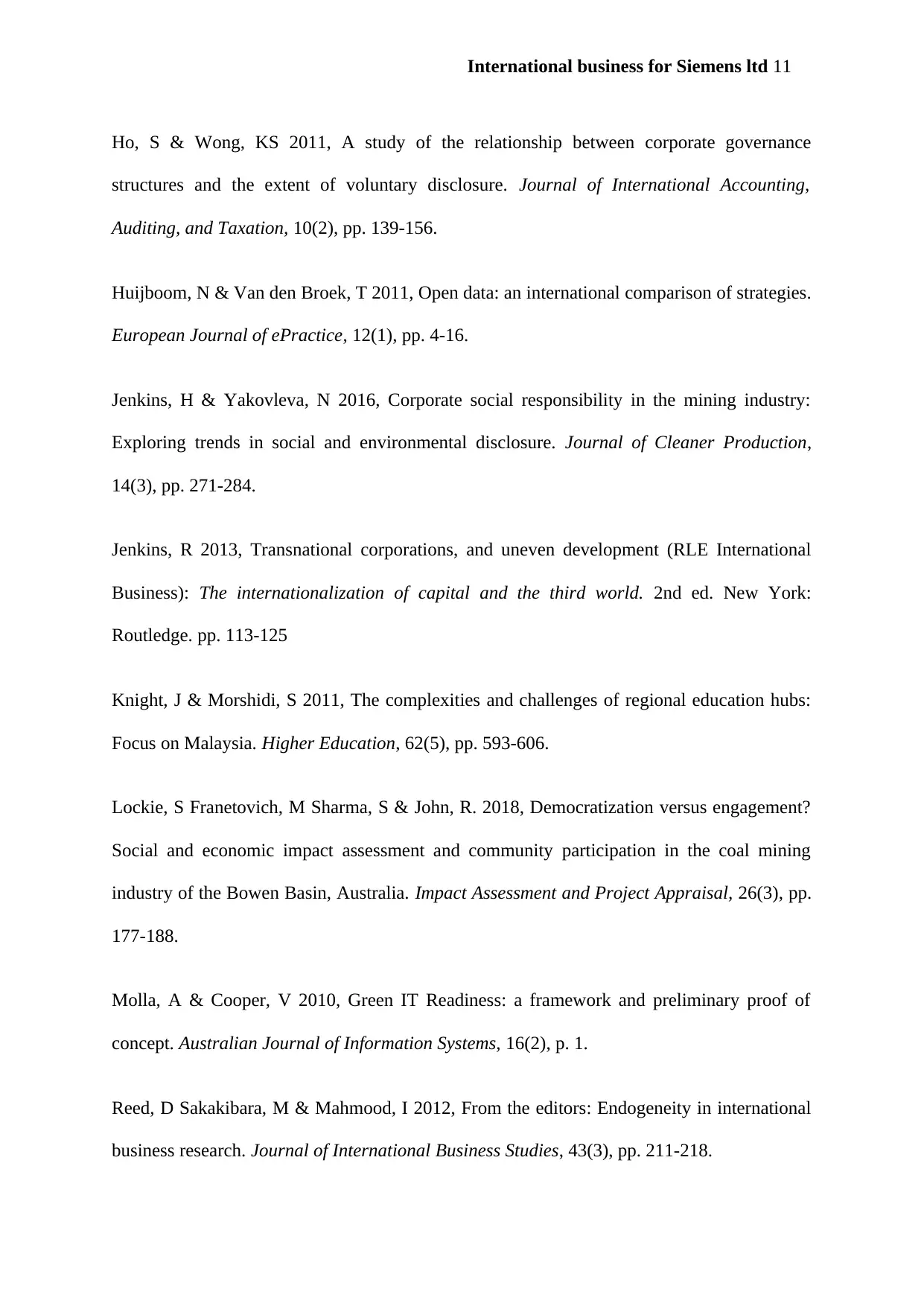
International business for Siemens ltd 11
Ho, S & Wong, KS 2011, A study of the relationship between corporate governance
structures and the extent of voluntary disclosure. Journal of International Accounting,
Auditing, and Taxation, 10(2), pp. 139-156.
Huijboom, N & Van den Broek, T 2011, Open data: an international comparison of strategies.
European Journal of ePractice, 12(1), pp. 4-16.
Jenkins, H & Yakovleva, N 2016, Corporate social responsibility in the mining industry:
Exploring trends in social and environmental disclosure. Journal of Cleaner Production,
14(3), pp. 271-284.
Jenkins, R 2013, Transnational corporations, and uneven development (RLE International
Business): The internationalization of capital and the third world. 2nd ed. New York:
Routledge. pp. 113-125
Knight, J & Morshidi, S 2011, The complexities and challenges of regional education hubs:
Focus on Malaysia. Higher Education, 62(5), pp. 593-606.
Lockie, S Franetovich, M Sharma, S & John, R. 2018, Democratization versus engagement?
Social and economic impact assessment and community participation in the coal mining
industry of the Bowen Basin, Australia. Impact Assessment and Project Appraisal, 26(3), pp.
177-188.
Molla, A & Cooper, V 2010, Green IT Readiness: a framework and preliminary proof of
concept. Australian Journal of Information Systems, 16(2), p. 1.
Reed, D Sakakibara, M & Mahmood, I 2012, From the editors: Endogeneity in international
business research. Journal of International Business Studies, 43(3), pp. 211-218.
Ho, S & Wong, KS 2011, A study of the relationship between corporate governance
structures and the extent of voluntary disclosure. Journal of International Accounting,
Auditing, and Taxation, 10(2), pp. 139-156.
Huijboom, N & Van den Broek, T 2011, Open data: an international comparison of strategies.
European Journal of ePractice, 12(1), pp. 4-16.
Jenkins, H & Yakovleva, N 2016, Corporate social responsibility in the mining industry:
Exploring trends in social and environmental disclosure. Journal of Cleaner Production,
14(3), pp. 271-284.
Jenkins, R 2013, Transnational corporations, and uneven development (RLE International
Business): The internationalization of capital and the third world. 2nd ed. New York:
Routledge. pp. 113-125
Knight, J & Morshidi, S 2011, The complexities and challenges of regional education hubs:
Focus on Malaysia. Higher Education, 62(5), pp. 593-606.
Lockie, S Franetovich, M Sharma, S & John, R. 2018, Democratization versus engagement?
Social and economic impact assessment and community participation in the coal mining
industry of the Bowen Basin, Australia. Impact Assessment and Project Appraisal, 26(3), pp.
177-188.
Molla, A & Cooper, V 2010, Green IT Readiness: a framework and preliminary proof of
concept. Australian Journal of Information Systems, 16(2), p. 1.
Reed, D Sakakibara, M & Mahmood, I 2012, From the editors: Endogeneity in international
business research. Journal of International Business Studies, 43(3), pp. 211-218.
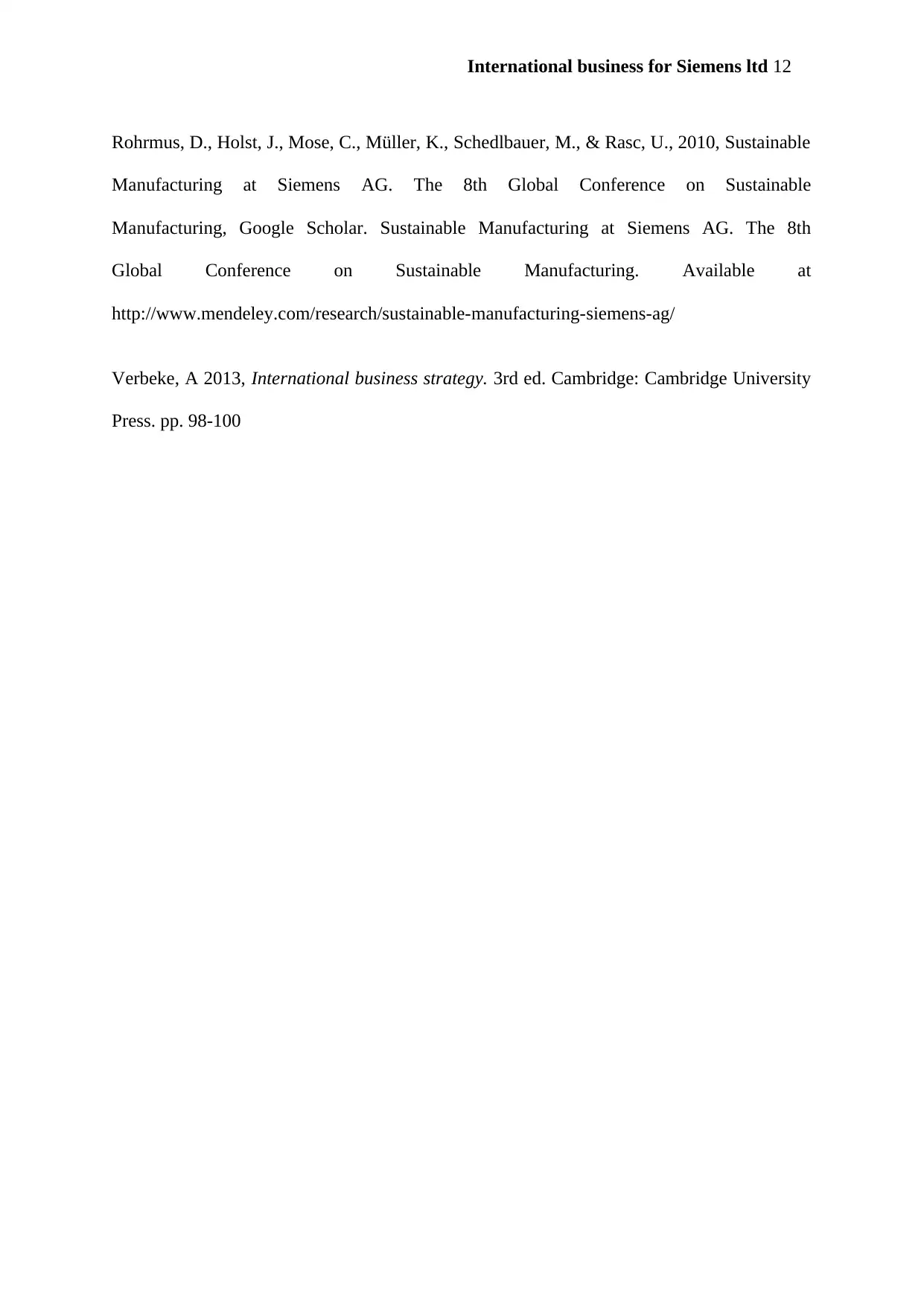
International business for Siemens ltd 12
Rohrmus, D., Holst, J., Mose, C., Müller, K., Schedlbauer, M., & Rasc, U., 2010, Sustainable
Manufacturing at Siemens AG. The 8th Global Conference on Sustainable
Manufacturing, Google Scholar. Sustainable Manufacturing at Siemens AG. The 8th
Global Conference on Sustainable Manufacturing. Available at
http://www.mendeley.com/research/sustainable-manufacturing-siemens-ag/
Verbeke, A 2013, International business strategy. 3rd ed. Cambridge: Cambridge University
Press. pp. 98-100
Rohrmus, D., Holst, J., Mose, C., Müller, K., Schedlbauer, M., & Rasc, U., 2010, Sustainable
Manufacturing at Siemens AG. The 8th Global Conference on Sustainable
Manufacturing, Google Scholar. Sustainable Manufacturing at Siemens AG. The 8th
Global Conference on Sustainable Manufacturing. Available at
http://www.mendeley.com/research/sustainable-manufacturing-siemens-ag/
Verbeke, A 2013, International business strategy. 3rd ed. Cambridge: Cambridge University
Press. pp. 98-100
⊘ This is a preview!⊘
Do you want full access?
Subscribe today to unlock all pages.

Trusted by 1+ million students worldwide
1 out of 12
Related Documents
Your All-in-One AI-Powered Toolkit for Academic Success.
+13062052269
info@desklib.com
Available 24*7 on WhatsApp / Email
![[object Object]](/_next/static/media/star-bottom.7253800d.svg)
Unlock your academic potential
Copyright © 2020–2025 A2Z Services. All Rights Reserved. Developed and managed by ZUCOL.





